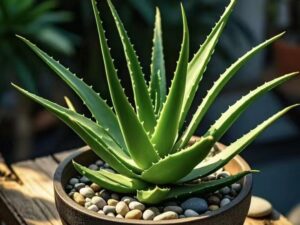In traditional culture, the connection between planting and feng shui is a complex one. People often carefully choose and nurture plants to create a harmonious living environment, hoping to enhance their fortune and promote health. Here’s a detailed look at how several common plants relate to feng shui:

Feng Shui Plants:Aloe Vera
Also known as dragon’s tongue, aloe vera thrives in sunny, fertile conditions but is sensitive to waterlogging. Despite its yin nature, it boasts impressive purifying abilities, effectively absorbing and neutralizing impurities and negative energies from the air. This helps curb the growth and spread of pathogens and other harmful elements. Aloe vera’s vitality is remarkable, and as it grows, it emits a significant life force that nourishes both mental and physical well-being. For families with members who frequently fall ill, having a pot of aloe vera can be beneficial. It actively siphons off illness and impurities, remaining vibrant and full of energy. At night, its respiration process intensifies, further improving air quality and creating a more comfortable, healthy atmosphere for those recovering from illness, aiding in their recovery and overall recuperation.

Feng Shui Plants:Ginger
Anciently dubbed “Lu Gen,” ginger is yang in nature and has a perennial root, symbolizing a solid foundation. It represents a robust base for career, academics, and official fortune. Its pungent quality enables it to dispel evil and impure energies. As ginger grows, it rises section by section, signifying steady progress in career, academics, and official fortune. If you aspire to prosper in these areas while avoiding petty people, planting ginger is worth considering. However, when asked about it, refer to it as “Lu Gen.” This is because Lu Gen is proud and dislikes being called by its real name. Once “ginger” is spoken, its efficacy plummets and is hard to restore. Planting Lu Gen must be a personal endeavor, including both planting and daily care, with each person limited to one plant to show respect and dedication. Regularly reciting the Tao Te Ching can help it thrive, but neglecting it after planting is a no-no. While Lu Gen can be repotted, avoid cutting it down once it sprouts, unless you want to share some fortune with close friends. In that case, you can cut a piece for them to plant, known as “sharing fortune,” but be aware this will detract from your own fortune, so think it through.
Feng Shui Plants:Cactus
Cacti are fierce and robust, thriving in sunny conditions and avoiding shade. They serve as protective plants with the ability to ward off evil and enhance the home’s energy. Due to their strong nature, they’re not ideal for bedrooms, which should maintain a peaceful and harmonious atmosphere. Placing a cactus in a bedroom could disrupt the tranquility and affect sleep quality. Instead, position them in areas with negative energy or where fortune is waning. Their thorns can combat evil with evil and poison with poison, neutralizing adverse feng shui influences. As thorny, fierce plants, cacti should not be placed in auspicious spots, as this could hinder the good fortune of those living in the home. Avoid staining cacti with blood or watering them with rice water or tea root water; stick to clear water to ensure optimal growth and feng shui benefits.
Feng Shui Plants:Polygonum Multiflorum
Preferring a warm, humid climate and well-ventilated conditions, polygonum multiflorum is less demanding than ginseng, which, despite its spiritual potency, is challenging to cultivate and not suited for bonsai. If you’re fortunate enough to grow ginseng, that’s ideal, but for many, polygonum multiflorum is a more practical and prosperous alternative. Combining your birth date and time with this plant can amplify its wealth-attracting properties. However, remember that polygonum multiflorum blesses only one person—the one who cultivates it. So, when caring for it, be clear about who you intend to benefit to fully harness its positive effects.



